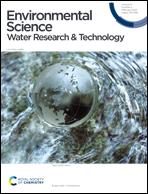Decentralised treatment solutions for on-site faecal sludge: quantifying the removal efficiencies of two novel systems in an East African city†
Abstract
Pit latrines, leach-tanks and septic tanks are on-site sanitation systems used by approximately 2.7 billion people. For these systems to be safe, the faecal sludge needs to be safely contained or removed and treated off-site. In lower-income countries, affordable and efficient treatment systems are frequently non-existent. One promising treatment technology for faecal sludge is decentralised mesophilic anaerobic digestion, which can operate without energy or chemical inputs. This study presents the first thorough evaluation of loading, rainfall and operational performance of two novel faecal sludge treatment plants (FSTP). The plants serviced approximately 3000 households in urban Dar es Salaam, Tanzania. The faecal sludge was extracted from latrine back-ends and transported to the plants which had loading capacities of 4 m3 d−1 for system 1 and 5 m3 d−1 for system 2. Systems were monitored for 14 consecutive weeks for physical, chemical and microbiological parameter removal through the treatment stages. Overall increased rainfall was not linked to emptying requests from households. System 1 was consistently overloaded while system 2 was under-loaded, due to an operator preference and demand. Overloading for system 1 was correlated with increased TSS in the effluent. Notably, both systems showed significant removal of total suspended solids (TSS), free-ammonia nitrogen (FAN) and E. coli from raw faecal sludge. However, only system 1 recorded significant removal for chemical oxygen demand (COD). As a new technology the standards required for effluent discharged to ground are not clear. However, the digested and dried faecal sludge from system 1 had E. coli concentrations of 2.5 × 106 cfu g−1 and was not recommended for unrestricted agricultural use based on the WHO guidelines. With more consistent operational loading practices, the FSTP evaluated present two sustainable treatment systems for lower-income urban settings.



 Please wait while we load your content...
Please wait while we load your content...